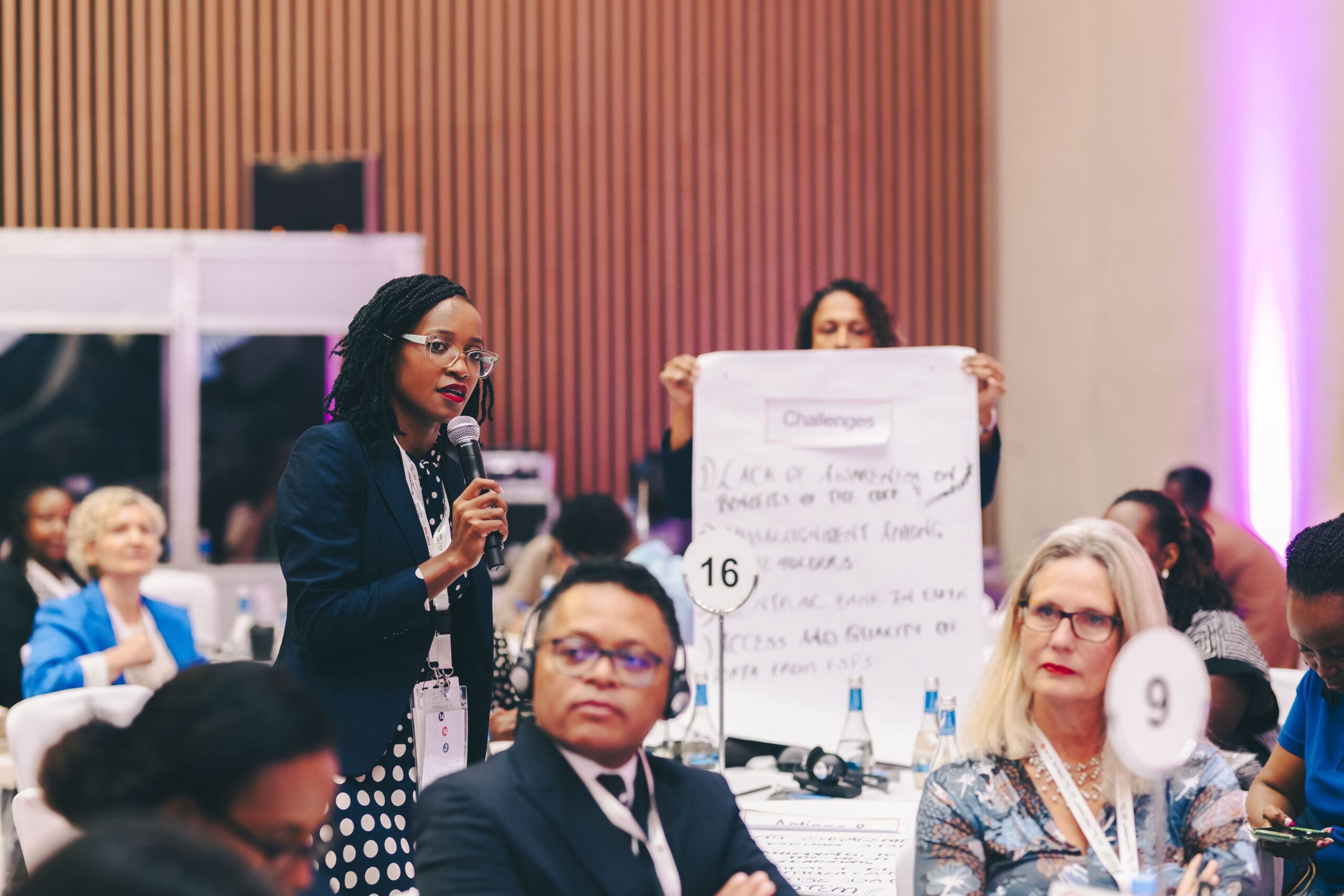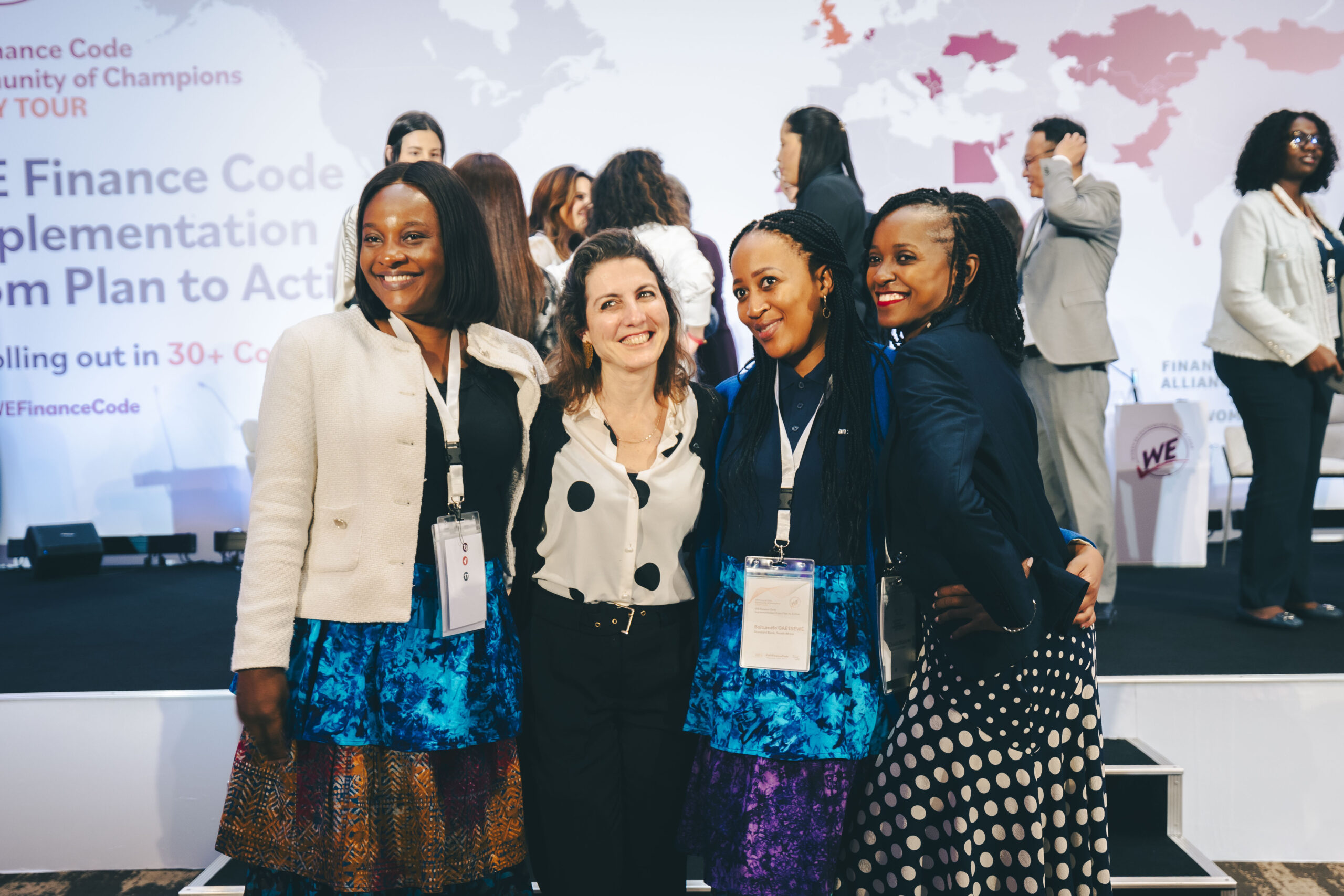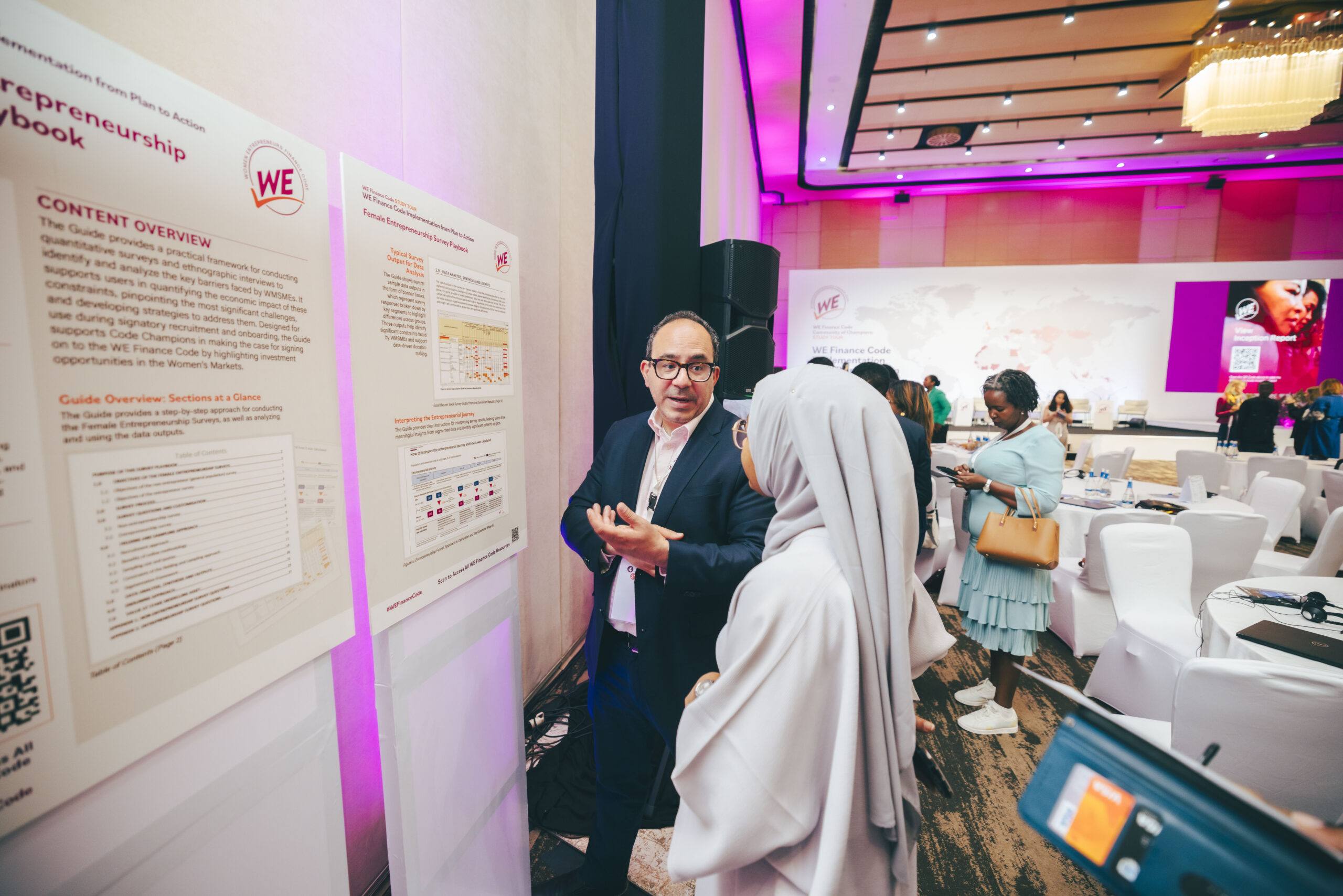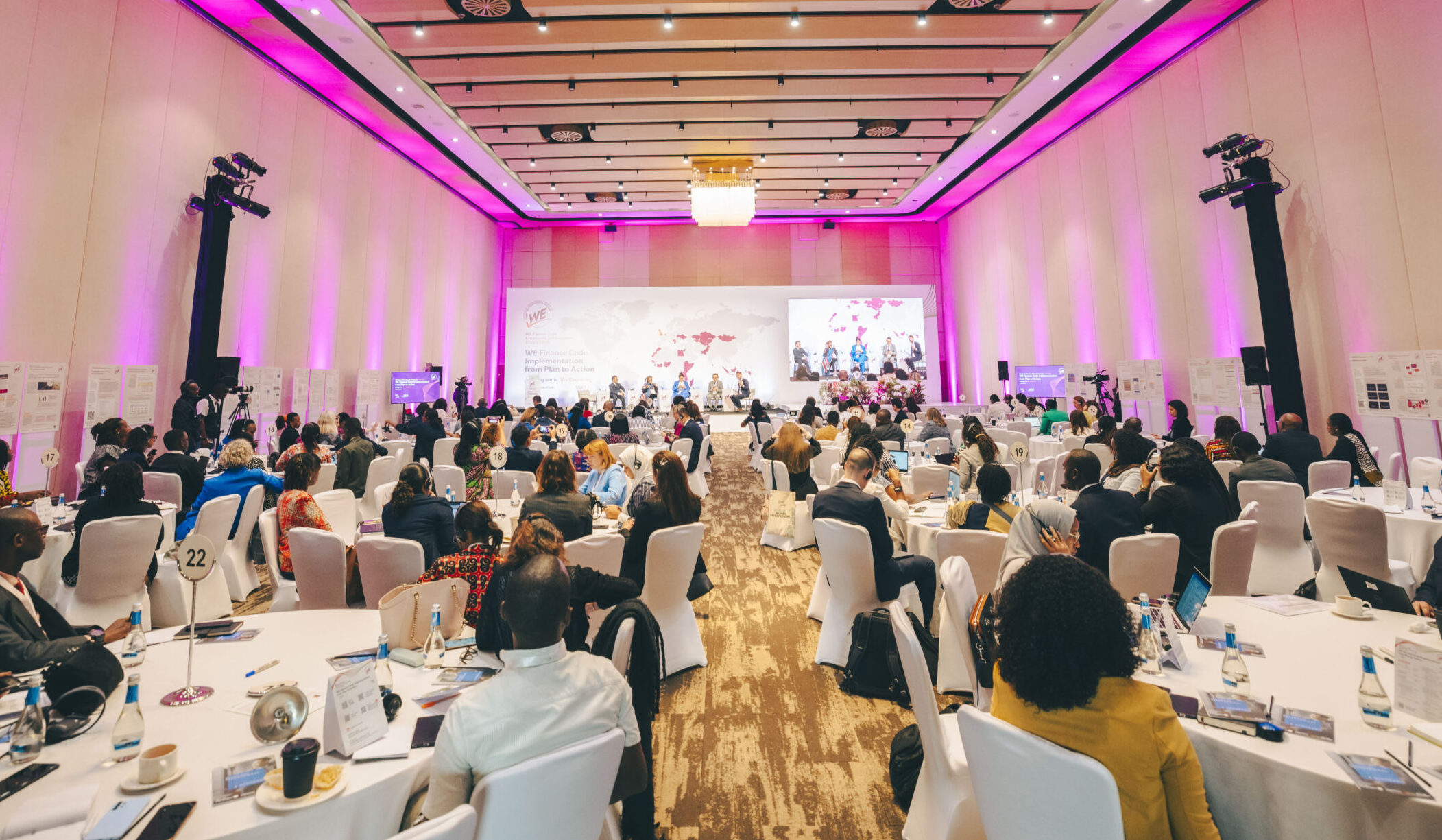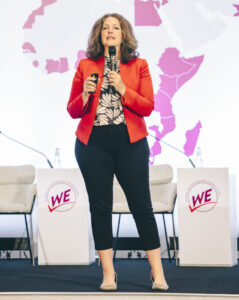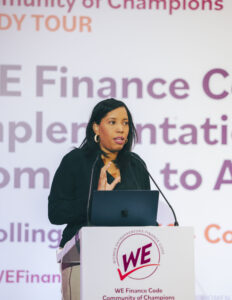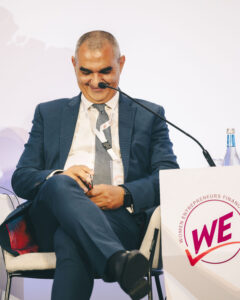Over 150 public and private sector WE Finance Code champions from 42 countries gathered in Kigali, Rwanda at the end of May 2025 with a shared mission: to convene and exchange lessons learned from piloting the WE Finance Code. With 29 countries piloting the Code around the world, the gathering of Code Champions was another milestone in the global movement to reshape financial systems to better serve women-led businesses.
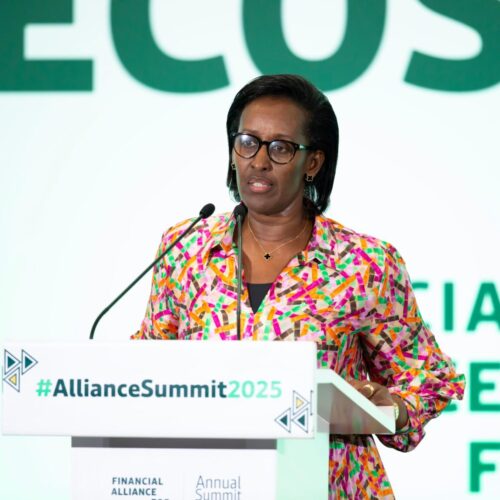
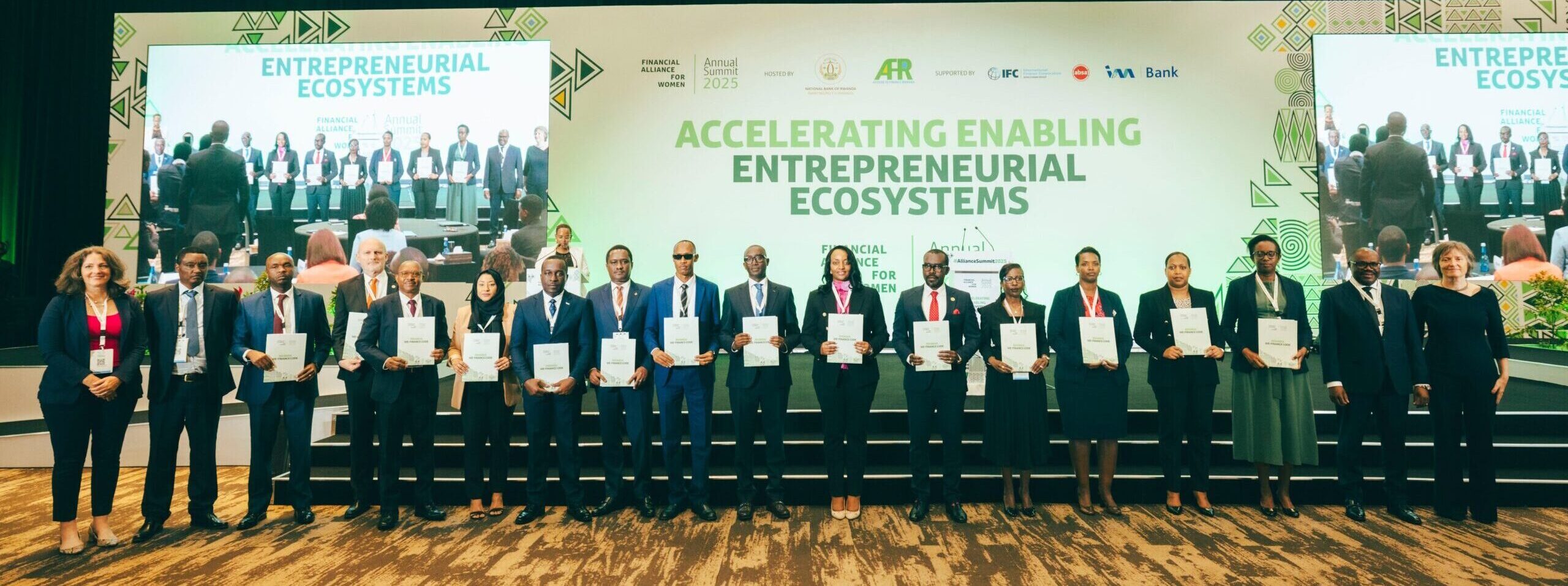
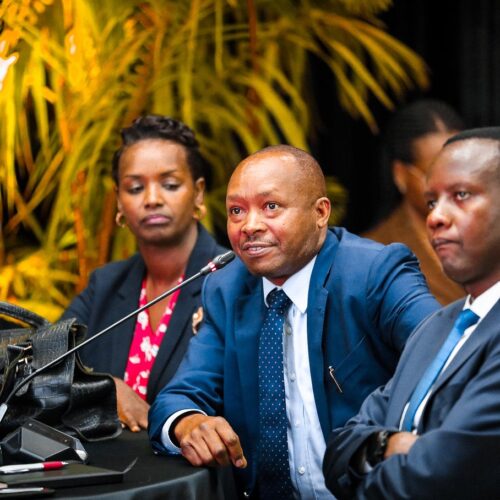
Rwanda Launches the WE Finance Code
H.E. Jeannette Kagame, First Lady of Rwanda, joined the Champions to officially launch Rwanda’s national Code. With both a little humor and a lot of determination, she highlighted during her remarks that with women leading Rwanda’s central bank, development bank, largest commercial bank, and Ministry of Finance, “how strange [it is] that despite overwhelming evidence we still find ourselves debating whether investing in women is good business.” Mrs. Kagame declared that her country understands that accelerating access to finance for women “…is not charity…[but] a matter of economic survival, national resilience, and global competitiveness” with entrepreneurship as the bedrock of Rwanda’s future economic growth.
Soraya M. Hakuziyaremye, Governor of the National Bank of Rwanda, also joined the launch, noting the breadth and depth of their national commitment makes the Rwandan Code unique. “It is our responsibility as regulators,” she remarked, “to not only preserve financial stability, but to ensure that the financial system serves the real economy and all of its people.” Women run 40% of businesses in Rwanda but represent only 25% of business borrowers. She revealed that closing this gap could unlock USD 700 million in additional GDP.
The Rwanda Code launch took place at the annual summit of the Financial Alliance for Women, and is supported by implementing partners at the World Bank.
Call to Action: Overcoming Opportunity Costs
Wendy Teleki, Head of the Women Entrepreneurs Finance Initiative (We-Fi), opened the convening with a powerful reminder: the economic cost of failing to support women entrepreneurs is staggering—between $165 and $280 billion in lost value over 10 years across just eight countries.
Her message was clear: it’s time to shift from planning to measurable impact. While leadership and data are vital enablers, action is the engine that drives the Code forward.
National Coalitions in Action: Localizing for Impact and Scaling What Works
The WE Finance Code’s flexible design is intended to maximize success through localization and adaptation to specific country contexts. With almost two years since the first Code launch, Champions from all stages of implementation were keen to learn and discuss best practices for national Code coalitions. At a peer learning session, Sophia Abu, Head of Gender and Special Segments at the Financial Inclusion Division of the Central Bank of Nigeria, presented a case study that illustrated the efficacy of integrating the WE Finance Code into Nigeria’s National Financial Inclusion Strategy to scale existing commitments and eliminate barriers to finance for women entrepreneurs. Instead of building new parallel structures, Nigeria uses existing working groups to ensure effectiveness and sustainability. They also utilize a public-facing dashboard to consolidate multiple data streams, including credit risk platforms, to promote transparency and demonstrate the economic imperative of financing women-led businesses through measurable outcomes.
During the session, Fierze Bajgora Hasani, Senior Bank Examiner at the Central Bank of Kosovo shared the Central Bank of Kosovo’s instrumental role in mobilizing its national Code, which stems from strong government support and empowered internal leadership, enabling effective collaboration and resource deployment. By positioning the WE Finance Code as a long-term investment in economic growth and societal wellbeing, the Central Bank is integrating its data markers into Credit Registry Guidelines and other reporting measures to enhance the quality and scope of financial indicators as well as the recognition of the Code’s profile within the country.
Dalma Hernandez, Manager of Social Banking at the Bankers Association of the Dominican Republic, and Valence Kimenyi, acting Executive Director for Financial Sector Development and Market Conduct at the National Bank of Rwanda, also joined the discussion moderated by Inez Murray, CEO of the Financial Alliance for Women.
As the newest signatory to the WE Finance Code, Rwanda’s strong leadership commitment is already apparent in the unity of key stakeholders spanning its financial ecosystem. Its coalition includes the country’s national bank, development finance institution, key ministries, and private sector leaders. Mr. Kimenyi was quick to point out that the recent launch was not merely symbolic, but a blueprint for systemic financial reform, rooted in leadership, data, and collective accountability. Rwanda’s Code is a mandate to move beyond dialogue to concrete implementation, ensuring no woman entrepreneur is left behind.
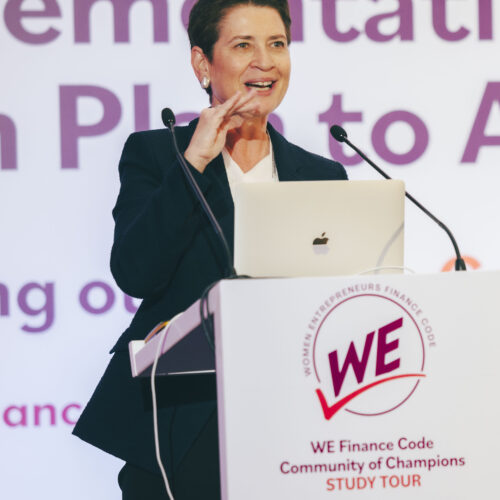
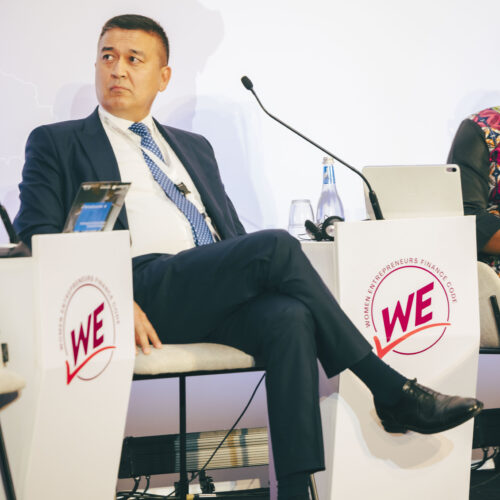
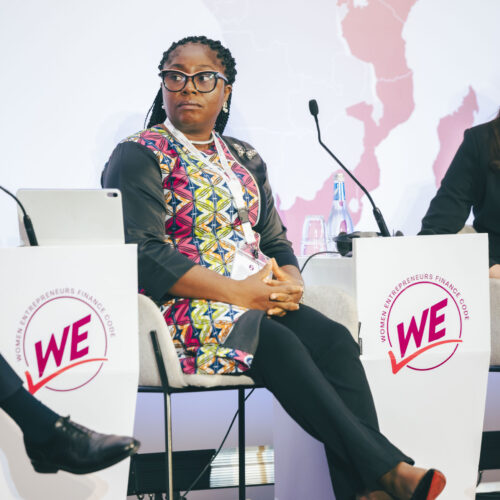
Recruiting Signatories: Building the Business Case
The second peer learning session featured successful strategies and processes for recruiting, onboarding, and engaging financial service providers with the WE Finance Code. Dana Kupova, Head of Financial Inclusion at the European Bank for Reconstruction and Development (EBRD), shared examples of how presenting a clear value proposition has helped her convince financial institutions across multiple countries to join the Code. The following panel, moderated by Etienne Sannicolo, Senior Financial Sector Specialist at the World Bank, affirmed the need to demonstrate the tangible value of the women’s business market, however the speakers also insisted that clear onboarding and ongoing support are critical to the implementation of the Code in new economies. Panelists included Amar Lkhagvasuren, Secretary-General and Chief Executive of the Mongolian Bankers Association; Dura Abu Shara, Financial Systems and Insurance Advisor for GIZ Jordan; Nnenna Jacob-Ogogo, Group Head of the Gender Desk at Nigeria’s First City Monument Bank; and Seheno A. Ranaivoson, General Secretary of Madagascar’s Banking and Financial Supervision Commission.
Together, their insights underscored a powerful message: unlocking the potential of women entrepreneurs requires not just commitment, but a clear roadmap with consistent support every step of the way from the WE Finance Code learning community.
Incentivizing Action: From Signing to Impact
During this session, Code Champions explored the role of incentives that central banks and development finance institutions can leverage to encourage financial service providers (FSPs) to convert their signed commitments into action for financing women entrepreneurs. With a special focus on Ukraine and supporting women entrepreneurs during times of crisis, Maryna Saprykina, Founder of the Ukrainian Women Entrepreneurs Hub, highlighted the inherent resilience of women entrepreneurs and the country’s sustained momentum and investment in them as a manifestation of hope: “Ukrainian women,” she said, “don’t have a Plan B – they have a plan to be.”
The following panel, moderated by Wendy Teleki, Head of the We-Fi Secretariat, considered other examples of impact from diverse economies including Egypt, Pakistan, and Kenya. Jessica Schnabel, Director of the International Finance Corporation (IFC)’s Women in Business Program discussed her experiences engaging with regulators to align policy mandates and incentives to maximize their critical enabling roles, while the other panelists shared examples of their own work and impact.
Faria Shahid, Head of Affluent Segments for Pakistan’s HBL Bank, cited the State Bank of Pakistan’s Banking on Equality Policy for increasing women’s financial inclusion from 7% to 50%, reducing the gender gap and achieving a 70% increase in female clients’ active accounts. In Egypt, the Central Bank partnered with Nile University’s Innovation Entrepreneurship and Competitiveness Centre to upskill and provide technical support for the flagship initiative NilePreneurs. Khaled Bassiouny, General Manager of Financial Inclusion at the Central Bank of Egypt, explained how the program has provided more than USD 270 million in startup revenue to over 300,000 companies since 2018, with 40% of the beneficiaries being women-led businesses. Lukania Geraldine Makunda, Market Information Lead for FSD Kenya, presented on how the Kenya Bankers Association is leveraging Credit Reference Bureau data to generate the country’s first sex-disaggregated databank of four million micro, small, and medium enterprises.
Across the world, it is clear: when regulators enable, and policy mandates align with incentives, real progress follows.
Emerging Practices in Data: Moving from Compliance to Strategy
Lack of sex-disaggregated data is often cited as an explanation for the USD 7 billion gender finance gap. This is why monitoring and reporting upon a commonly agreed set of indicators for women’s micro, small and medium enterprises (WMSMEs) is a foundational pillar of the WE Finance Code. During this session, Elizabeth Rojas, 2nd Vice President of Women’s Business Strategy for Banco BHD in the Dominican Republic and Solongo Jantsan, Senior Supervisor of The Bank of Mongolia presented case studies to illustrate how their countries are advancing data collection efforts through local implementation of the Code. Ms. Rojas showcased how her bank is embedding sex-disaggregated data into its core strategy, turning compliance into a competitive advantage; while Ms. Jantsan presented Mongolia’s progress towards a real-time, centralized WMSME dashboard with plans to expand into the non-bank sector and use micro-level data to design targeted solutions for smarter policy development.
The subsequent panel emphasized the importance of sex-disaggregated data, with Nigeria showcasing a public-facing dashboard to promote transparency, while Pakistan and the Kyrgyz Republic shared efforts to centralize and standardize data collection, reaffirming that such data is critical for performance and innovation across the financial ecosystem.
Panelists included Temitope Akin-Fadeyi, Head of the Financial Inclusion Delivery Unit at the Central Bank of Nigeria; Fizza Khalid, Assistant Director at the State Bank of Pakistan; Behtur Aliev, Deputy Chairman of the National Bank of the Kyrgyz Republic; and Dalma Hernandez, Manager of Social Banking at the Bankers Association of the Dominican Republic. The discussion was moderated by Anna Gincherman, Partner at ConsumerCentriX and a key collaborator in the global Code rollout.
Closing Reflections: From Dialogue to Delivery
In her closing remarks, Wendy Teleki, We-Fi Secretariat Head, reflected on the Code’s growing traction since the last global Champions gathering in the United Kingdom last year. With growing interest in gender bonds, risk-sharing facilities, and capital market solutions, the next phase of the WE Finance Code will focus on results and therefore strengthening the business case for targeted support of women’s entrepreneurship.
